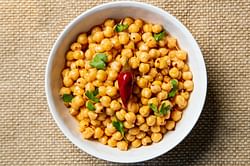Chickpeas, also known as garbanzo beans, are a type of legume that is often consumed in the form of hummus. Chickpeas are an excellent source of nutrition and have many health benefits. They are a good source of protein and fibre, and they contain a variety of vitamins and minerals. Chickpeas are also low in calories and fat, and they are a good source of antioxidants.
Protein is essential for the growth and maintenance of all body tissues, including muscles, bones, organs, and skin. Fibre is important for digestive health and helps prevent constipation. The vitamins and minerals in chickpeas are essential for many bodily functions, including immunity, metabolism, and nerve and muscle function.
The antioxidants in chickpeas help protect the body from damage caused by free radicals. Free radicals are molecules that can damage cells, and they are a byproduct of normal metabolism. Antioxidants help neutralise free radicals and prevent them from causing damage.
Chickpeas are nutritious food that can be enjoyed in a variety of ways. They can be added to soups, salads, and stews, or they can be eaten as a snack. They can also be ground into a flour that can be used to make bread, pasta, and other foods.
What is the nutrition in chickpeas?
The nutrient value of 100 g of chickpeas according to the United States Department of Agriculture (USDA) is as follows:
Water: 60.2 g
Energy: 164 kcal
Protein: 8.86 g
Carbohydrate: 27.4 g
Fibre: 7.6 g
Sugars: 4.8 g
Calcium: 49 mg
Sodium: 7 mg
Potassium: 291 mg
What are the health benefits of chickpeas?
1. Can help lose weight
Chickpeas are high in fibre and protein, which can help you feel full and reduce your calorie intake. Fibre also helps promote regularity and may reduce your risk of obesity.
2. May lower cholesterol levels
The soluble fibre in chickpeas can help lower your cholesterol by binding to bile acids and removing them from your body. This can help reduce your risk of heart disease.
3. May stabilise blood sugar levels
The fibre in chickpeas can help slow down the absorption of sugar, which can help stabilise blood sugar levels. This is especially beneficial for people with diabetes.
4. Improve gut health
Chickpeas are a good source of prebiotic fibre, which feeds the good bacteria in your gut. This can help improve gut health and reduce your risk of gastrointestinal disorders.
5. May help reduce inflammation
Chickpeas contain antioxidants that can help reduce inflammation throughout the body. This can lead to a reduced risk of chronic diseases such as heart disease, cancer, and arthritis.
6. Can boost energy levels
Chickpeas are a good source of iron, which is essential for energy production. They also contain B vitamins, which are necessary for converting food into energy.
7. Can improve brain function
Chickpeas are a good source of folate, which is important for cognitive health. Folate can help improve brain function and reduce the risk of cognitive decline.
What are some risks of eating chickpeas?
Though they are generally considered to be healthy food, there are some potential side effects associated with consuming chickpeas. For example, some people may experience gas or bloating after eating chickpeas because chickpeas contain oligosaccharides, a type of carbohydrate that is difficult for the body to digest. As a result, consuming too many chickpeas can lead to digestive problems like flatulence and abdominal pain.
In addition, chickpeas are a high-FODMAP food, which means that they can exacerbate symptoms of irritable bowel syndrome (IBS). If you suffer from IBS, it's best to avoid eating chickpeas or any other high-FODMAP foods.
Finally, chickpeas are a common allergen, so people with food allergies may need to avoid them. If you're allergic to chickpeas, consuming even a small amount can trigger a severe allergic reaction, so it's important to be aware of this potential risk.
Overall, chickpeas are generally safe for most people to eat. However, if you experience any digestive issues after eating them, it's best to avoid them. And if you have a food allergy, it's important to be aware of the potential risk of a severe allergic reaction.
What are some ways to eat chickpeas?
Chickpeas are often used in Mediterranean and Indian cuisines. Chickpeas are high in fibre and protein, which makes them a great food to include in a healthy diet. There are many ways to enjoy chickpeas, and here are a few ideas:
1. Add them to a salad for a boost of protein and fibre.
2. Make a simple chickpea soup by simmering chickpeas in broth with some vegetables and spices.
3. Use them as a base for a veggie burger or veggie wrap.
4. Roast them in the oven with some spices for a crunchy snack.
5. Add them to a stir fry or curry for extra protein and flavour.
Frequently Asked Questions
Are chickpeas as healthy as vegetables?
The health benefits of chickpeas (and other legumes) compared to those of vegetables can vary depending on the individual. However, both chickpeas and vegetables are considered to be healthy foods that can help promote weight loss, lower cholesterol levels, and reduce the risk of certain chronic diseases.
Should you remove chickpea skin?
There is no scientific evidence to support the removal of chickpea skin.
Are chickpeas an inflammatory food?
Some people may find that they experience digestive or other issues after consuming chickpeas, so it is best to speak with a healthcare provider if you have concerns.
Are canned chickpeas just as healthy?
Canned chickpeas are healthy, but there are some concerns about the canning process. Bisphenol A (BPA) is a chemical that is used in the lining of canned foods, and it can leach into the food. BPA has been linked to a variety of health problems, including hormone disruptions, cancer, and fertility problems. Some companies have started using BPA-free cans, but it is not clear if they are completely safe.
